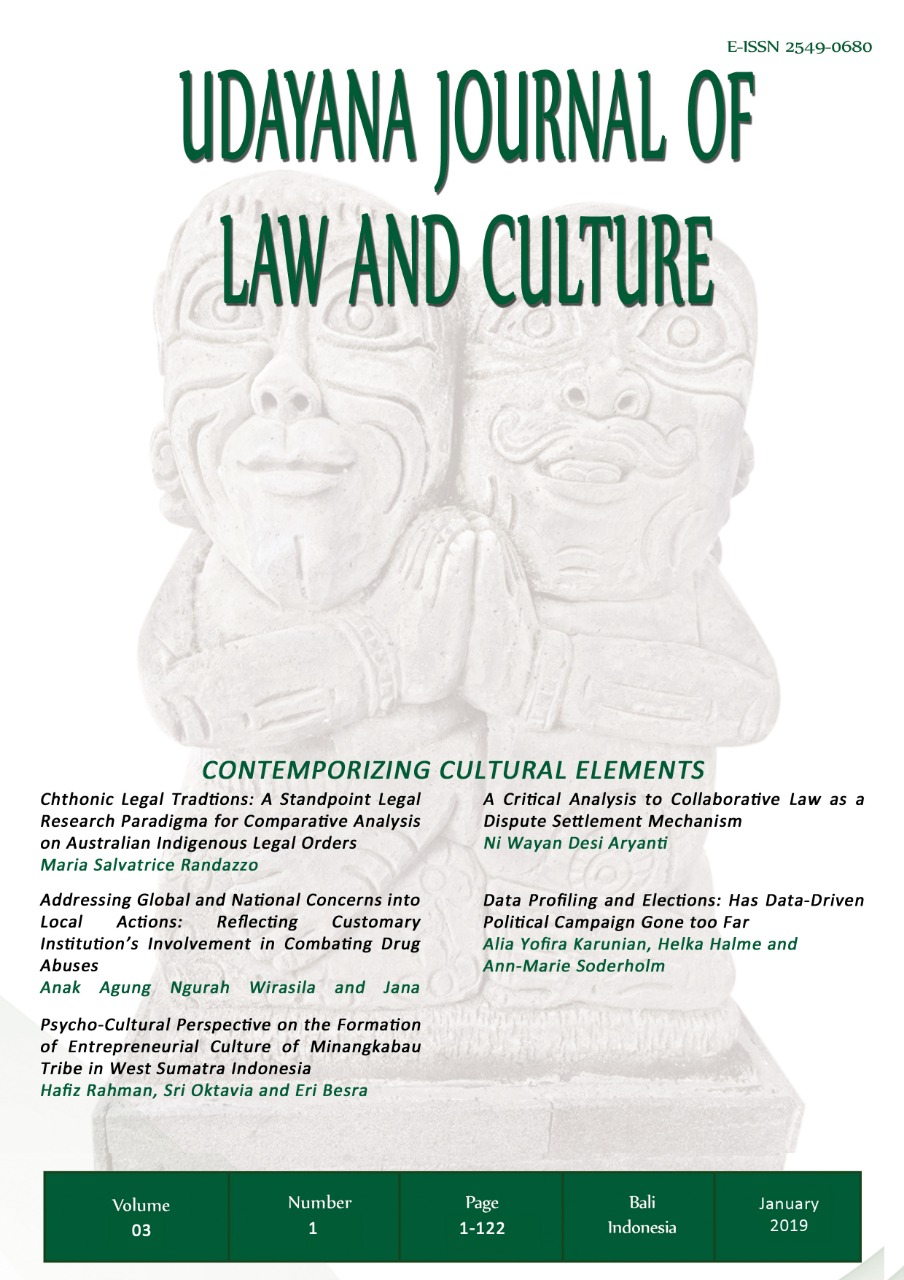A Critical Analysis of Collaborative Law as a Dispute Settlement Mechanism
Abstract
The increasing number of practitioners who employ Collaborative Law as an alternative dispute resolution method indicates its relevance in resolving legal cases, especially in the field of Family Law. Following its incorporation into legislation in some States in the United States of America, the current practice of Collaborative Law seems to run further than what was developed in 1990 by a family lawyer, Stuart Webb in Minneapolis. This article attempts to expose that while Collaborative Law is beneficial in resolving family disputes, its distinct feature-disqualification provision poses some drawbacks to disputants. Besides, it assesses how clients screening and combining Collaborative Law with mediation can minimize disqualification provision’s disadvantages. Lastly, this article examines why Collaborative Law’s application in non-family disputes is limited.
Downloads
References
Fisher, Roger, William L. Ury, and Bruce Patton. Getting to Yes: Negotiating Agreement without Giving in. Penguin, 2011.
Glenn, Donald A., Thomas F. Burrage, Donald DeGrazia, and William Stewart. Family Law Services Handbook: The Role of the Financial Expert. John Wiley and Sons, 2010.
Nolan-Haley, Jacqueline. Alternative Dispute Resolution in a Nutshell, 4th. West Academic, 2013.
Roberts, Simon, and Michael Palmer. Dispute Processes: ADR and the Primary Forms of Decision-Making. Cambridge University Press, 2005.
Council, Family Law. "Collaborative Practice in Family Law: A Report to the Attorney-General Prepared by the Family Law Council." (2007).
Journal Article
Comes, Diana M. "Meet Me in the Middle: The Time is Ripe for Tennessee to Adopt the Uniform Collaborative Law Act." U. Mem. L. Rev. 41 (2010): 551-595.
Chrisman, P. Oswin, Gay G. Cox, and Petra Novotna. "Collaborative Practice Mediation: Are We Ready to Serve this Emerging Market." Pepp. Disp. Resol. LJ 6, no.3 (2006): 451-464.
Edwards, Jo, Amanda Sandys and Jamie Gaw, ‘New Opportunities in Collaborative Practice,’ Family Law Journal- Lexis Nexis, 48 (2018): 330.
Fairman, Christopher M. "Growing Pains: Changes in Collaborative Law and the Challenge of Legal Ethics." Campbell L. Rev. 30 (2007): 237-273.
Gilson, Ronald J., and Robert H. Mnookin. "Disputing through Agents: Cooperation and Conflict between Lawyers in Litigation." Columbia Law Review 94, no. 2 (1994): 509-566. https://doi.org/10.2307/1123202
Hoffman, David A. “Collaborative Law in the World of Business.” The Collaborative Review 6 (2003).
Langan, Elena B. "We Can Work it Out: Using Cooperative Mediation-A Blend of Collaborative Law and Traditional Mediation-to Resolve Divorce Disputes." Rev. Litig. 30 (2010): 245-316.
Lande, John. "An Empirical Analysis of Collaborative Practice." Family Court Review 49, no. 2 (2011): 257-281. https://doi.org/10.1111/j.1744-1617.2011.01369.x
Lande, John. "Possibilities for Collaborative Law: Ethics and Practice of Lawyer Disqualification and Process Control in a New Model of Lawyering." Ohio St. LJ 64 (2003): 1315-1379.
Macfarlane, Julie. "Experiences of Collaborative Law: Preliminary Results from the Collaborative Lawyering Research Project." J. Disp. Resol. (2004): 179-226.
Pratt, Joel M. "Three Tiers for Collaborative Law: A Moderate Solution." Resolved: J. Alternative Disp. Resol. 5, no.2 (2015): 4-25.
Rack Jr, Robert W. "Settle or Withdraw: Collaborative Lawyering Provides Incentive to Avoid Costly Litigation." Disp. Resol. Mag (1998): 8-9.
Spain, Larry R. "Collaborative Law: A Critical Reflection on Whether a Collaborative Orientation Can Be Ethically Incorporated into the Practice of Law." Baylor L. Rev. 56 (2004): 141-172.
Schwab, William H. "Collaborative Lawyering: A Closer Look at an Emerging Practice." Pepperdine Dispute Resolution Law Journal 4, no. 3 (2004): 351-396.
Tesler, Pauline H. "Collaborative Family Law." Pepp. Disp. Resol. LJ 4 (2003): 317-336.
"Uniform Collaborative Law Rules and Uniform Collaborative Law Act (Last Revised or Amended in 2010)." Family Law Quarterly 48, no. 1 (2014): 55-177.
Wolski, Bobette. "Collaborative Law: An (un) Ethical Process for Lawyers?." Legal Ethics 20, no. 2 (2017): 224-241. https://doi.org/10.1080/1460728x.2017.1397401
Website Content
Abney, Sherrie R. Why Would Anyone Use Civil Collaborative Law?. American Bar Association, march 31, 2018, https://www.americanbar.org/content/dam/aba/publications/dispute_resolution_magazine/Abney_Why_Use_GVB_edit.authcheckdam.pdf
Jensen, Keld. Why Negotiators Still Aren't 'Getting To Yes'. Forbes, January 11, 2018, https://www.forbes.com/sites/keldjensen/2013/02/05/why-negotiators-still-arent-getting-to-yes/#24009b7a2640
Sapountsis, Anna. ‘Challenges of Collaborative Practice and the Commercial Context’. Civil justice.info, March 31, 2018. http://www.civiljustice.info/cgi/viewcontent.cgi?article=1000&context=collab
Other Documents
Unpublished Description of IACP Research, Information Sheet, FAQ Based on Cases Reported to the International Academy of Collaborative Professionals Research Project (Oct. 25, 2009),
International Academy of Collaborative Professionals, ‘Standards and Ethics’ (2017)








